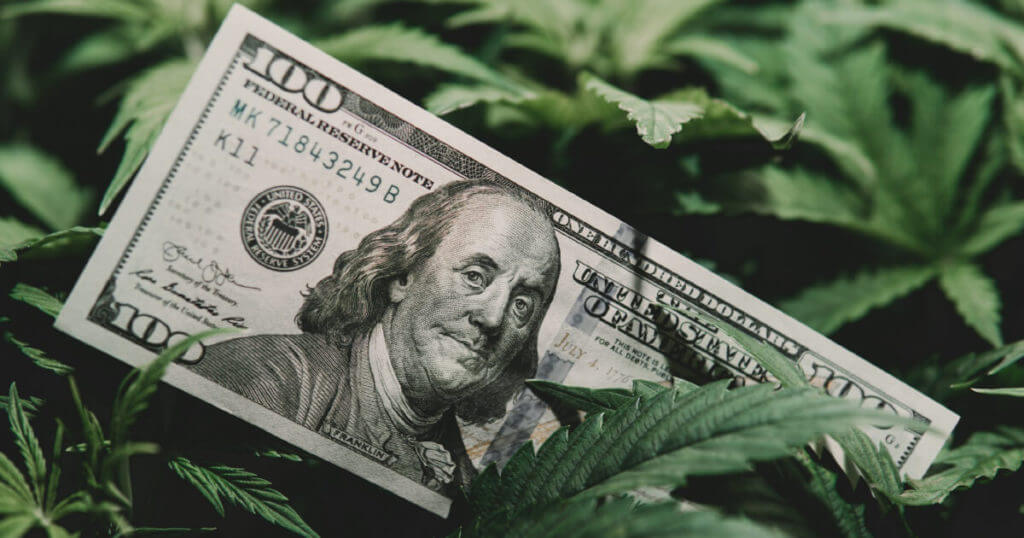With tax time just around the corner, many cannabis retailers are gearing up to once again report massive year-end net losses due to the impact that Section 280E of the federal tax code has on their financials.
You may be asking yourself how is that even possible, considering the US cannabis industry as a whole recorded a whopping $17.5 billion in sales in 2020. But the reality is that Section 280E of the federal tax code has had an incredibly draining impact on cannabis financials since the Schedule I controlled substance was legalized in many states.
If you’re unfamiliar with 280E, it states, “no deduction or credit shall be allowed for any amount paid or incurred during the taxable year in carrying on any trade or business if such trade or business (or the activities which comprise such trade or business) consists of trafficking in controlled substances (within the meaning of schedule I and II of the Controlled Substances Act) which is prohibited by Federal law or the law of any State in which such trade or business is conducted.”
Essentially, what that means is that tax deductions and credits that other non-cannabis-related businesses are allowed to use do not apply to cannabis retailers – despite their legality – due to the fact that cannabis is still considered a Schedule I controlled substance under federal law.
The History Of Section 280E
If you don’t know the history of the inclusion of Section 280E into the federal tax code, strap in, because it’s a doozy.
In 1961, the Supreme Court made a decision that every citizen of the United States had to pay taxes, whether they made their income legally or otherwise. This allowed them the ability to collect taxes on the sale of illegal narcotics.
Enter Jeffrey Edmonson. The year is 1974, and Edmonson, a small-time drug trafficker in Minneapolis, was arrested and charged with trafficking. Then, the IRS came knocking and demanded that Edmonson pay roughly $17,000 owed in back taxes for failing to declare his (illegally obtained) income.
Edmonson may have only been a small-time trafficker, but he was not small-minded. He decided that if he would have to pay taxes on his illegally obtained income, then he should be able to claim business expenses for his – illegal – business. And that’s just what he did.
In 1975, he filed a tax return for the 1974 tax year, in which he claimed business expenses for the 100 pounds of cannabis, 1.1 million amphetamine tablets, and 13 oz of cocaine that he moved that year.
RELATED READING – Taxed to Death: Follow One Gram of Weed along California’s Twisted Path from Seed to Sale
According to court documents, the businesses expenses included everything from airfare and miles on his car to pick up the drugs, to a $50 scale. “He drove his automobile 29,000 miles, of which two-thirds of such mileage was attributable to business use. Petitioner made a business trip to San Diego, California, in December of 1974 in connection with which he incurred expenses of $250 for airfare and $200 for food and entertainment.
The petitioner purchased a scale to be used in his business for $50. Petitioner incurred packaging expenses for the sale of controlled substances of $200. Telephone expenses that were attributable to the petitioner’s business consisted of $180 of long-distance charges and two-thirds of his base rate charges of $204, or $136. Petitioner paid rent in the amount of $2,360 for his apartment, which was also his only place of business.”
And, as luck would have it, the judge sided with Edmonson.
Not happy with the egg all over their face, in 1982, Congress vowed that they would never be faced with another loophole such that Edmonson found again. This is what gave rise to Section 280E of the federal tax code, prohibiting the use of tax deductions or credits for businesses that dealt in Schedule I controlled substances.
What Can And Cannot Be Deducted By Legal Cannaretailers?
Section 280E has a massive impact on cannabis financials when it comes to tax season. Many of the deductions that other businesses are able to claim are unavailable to cannabis retailers.
According to Seeking Alpha, some of the deductions that legal cannabis retailers are unable to claim include, “advertising, marketing, bad debts, board meeting expenses, business association dues, vehicle expenses, charitable deductions, legal fees, office supplies, payroll processing, payroll taxes for employees (including Social Security, Medicare and unemployment taxes), parking, tolls, sales staff salaries and wages, equipment and repairs, furniture and fixtures, rent, home office expenses, insurance premiums, shipping costs, computer software and equipment, utilities, website, workers compensation, and many more things.”
Legal cannabis retailers are able to claim a few things, however, but it’s not nearly enough to make a difference in their Net Income After Taxes. Among the deductions they are able to claim are invoice prices for the cannabis product’s costs; bills for electricity used in the growing, packing, or inventory sectors; any claims on transportation, such as the cost of legal shipment or the expense of traveling to obtain product; the cost of supplies and raw materials, including plants, fertilizer, and seeds; and indirect product costs such as maintenance of equipment, utility expenses incurred during the growing process, inspections, and quality control.
How Does 280E Impact Cannabis Financials
So what kind of impact, exactly, does Section 280E have on cannabis retailers? It’s quite simple, really. For non-cannabis businesses, the tax rate is based on their net income, while for cannabis businesses, their tax rate is based on their gross profits.
Here’s a quick table to give an example.
| Non-Cannabis Business | Legal Cannabis Retailer | |
| Revenue | $1,000,000 | $1,000,000 |
| Cost of Goods Sold (COGS) | $300,000 | $300,000 |
| Other Expenses | $400,000 | $400,000 |
| Net Income | $300,000 | $300,000 |
| Gross Profit | $700,000 | $700,000 |
| Federal Tax | 35% | 35% |
| Amount Paid in Taxes | $105,000 | $245,000 |
| Net Income After Taxes | $195,000 | $55,000 |
| Effective Tax Rate | 35% | 82% |
For an even more in-depth explanation, MJBizDaily has an even handier infographic in their article “EBTIDA versus net profit: Making sense of a cannabis financial mess.”
As you can see, there’s quite a discrepancy between the taxation of cannabis-related businesses and non-cannabis-related businesses. More and more canny retailers are finding themselves with a Net Income After Taxes in the minuses. Considering the recreational use and sale of cannabis is now legal in 18 states and the District of Columbia, and a further 13 states have decriminalized its use, it’s high time that the federal government either repeal Section 280E or remove cannabis from the list of Schedule I controlled substances.
Most Popular News Posts
- Glassblowing is Not a Crime But That Wasn’t Always the Case – A Look Back at Operation Pipe Dreams
- A Brief 50,000 Year History of Our Relationship with Psilocybin Mushrooms
- How to Middleman a Goddamn Motherf*ckin’ Hemp Biomass Deal
- Study Uncovers Traces of Xanax in 72% of Blood Samples Yet We Still Have to Fight For Cannabis Rights




